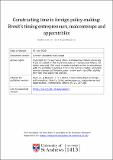Files in this item
Constructing time in foreign policy-making : Brexit's timing entrepreneurs, malcontemps and apparatchiks
Item metadata
| dc.contributor.author | Hom, Andrew | |
| dc.contributor.author | Beasley, Ryan K. | |
| dc.date.accessioned | 2023-03-08T00:41:23Z | |
| dc.date.available | 2023-03-08T00:41:23Z | |
| dc.date.issued | 2021-03-08 | |
| dc.identifier | 269029354 | |
| dc.identifier | 65f5b342-fd27-4063-b617-fe3db05b0917 | |
| dc.identifier | 000648944000004 | |
| dc.identifier | 85104862520 | |
| dc.identifier.citation | Hom , A & Beasley , R K 2021 , ' Constructing time in foreign policy-making : Brexit's timing entrepreneurs, malcontemps and apparatchiks ' , International Affairs , vol. 97 , no. 2 , pp. 267-285 . https://doi.org/10.1093/ia/iiaa162 | en |
| dc.identifier.issn | 0020-5850 | |
| dc.identifier.other | ORCID: /0000-0001-7928-6504/work/90951993 | |
| dc.identifier.uri | https://hdl.handle.net/10023/27120 | |
| dc.description.abstract | Temporal considerations play a role in many models of foreign policy analysis, particularly those focused on decision-making processes. While time features prominently as a background feature against which sequence, cadence and psychological consequence are measured, little attention has been given to how foreign policy agents actively construct their temporal environments. We propose that different foreign policy-making actors develop distinct relationships with time, and that variations in these relationships can help account for the ways in which ‘events’ are transformed into routine practices, change opportunities or full-blown foreign policy crises. We advance a novel conception of time in foreign policy-making through our development of timing theory and the linguistic constructions of ‘time’ by foreign policy actors. We propose a typology of timing agency, which highlights the impact of these orientations on decision-making processes as well as the characteristics of foreign policy behaviours. Using the case of Brexit, we elaborate differences in actors' temporal orientations and show how such differences impact the making of foreign policy. | |
| dc.format.extent | 19 | |
| dc.format.extent | 396578 | |
| dc.language.iso | eng | |
| dc.relation.ispartof | International Affairs | en |
| dc.subject | Brexit foreign policy | en |
| dc.subject | Critical theory | en |
| dc.subject | Culture and politics/IR | en |
| dc.subject | Foreign policy | en |
| dc.subject | Foreign policy analysis | en |
| dc.subject | International relations theory | en |
| dc.subject | JZ International relations | en |
| dc.subject | JN101 Great Britain | en |
| dc.subject | Social Sciences(all) | en |
| dc.subject | Arts and Humanities(all) | en |
| dc.subject | T-NDAS | en |
| dc.subject | MCC | en |
| dc.subject | NCAD | en |
| dc.subject.lcc | JZ | en |
| dc.subject.lcc | JN101 | en |
| dc.title | Constructing time in foreign policy-making : Brexit's timing entrepreneurs, malcontemps and apparatchiks | en |
| dc.type | Journal article | en |
| dc.contributor.institution | University of St Andrews. Centre for Global Law and Governance | en |
| dc.contributor.institution | University of St Andrews. School of International Relations | en |
| dc.identifier.doi | https://doi.org/10.1093/ia/iiaa162 | |
| dc.description.status | Peer reviewed | en |
| dc.date.embargoedUntil | 2023-03-08 |
This item appears in the following Collection(s)
Items in the St Andrews Research Repository are protected by copyright, with all rights reserved, unless otherwise indicated.

